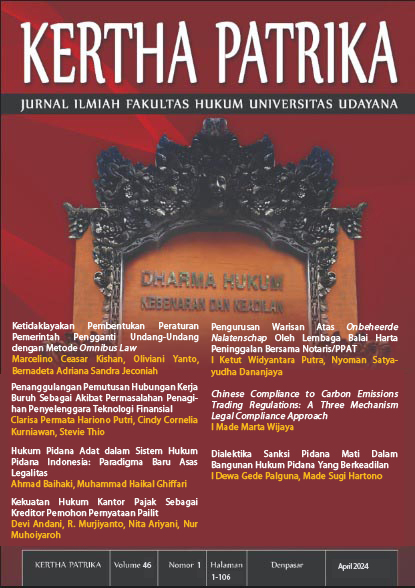Chinese Compliance to Carbon Emissions Trading Regulations: A Three Mechanism Legal Compliance Approach
Abstract
The Hobbesian mechanism emphasizes the enforcement of sanctions as the primary means to ensure compliance, while the Durkheimian mechanism focuses on the symbolic legitimacy of the law and the importance of morality in law enforcement, and the Habermasian mechanism centers on rational communication and consensus in achieving societal compliance. This research aims to identify the application of these three legal compliance mechanisms (Hobbesian, Durkheimian, and Habermasian) in China regarding the implementation of carbon emissions trading regulations under the Kyoto Protocol 1997 and the Paris Agreement 2015 by the United Nations Framework Convention on Climate Change. The study employs normative legal research methods with legislative and conceptual approaches. The findings reveal regional variations in the implementation of carbon emissions trading regulations in China, with diverse levels of compliance among companies. Although overall compliance is relatively high, challenges in enhancing compliance persist, particularly in regions like Beijing and Tianjin. Factors such as local government policies, imposed sanctions, and administrative capacity play crucial roles in determining compliance levels. Analysis of compliance with carbon emissions trading regulations across different administrative levels in China demonstrates diverse outcomes. At the central level, Chinese government compliance with regulations is driven by moral awareness of climate change, reflecting the Durkheimian mechanism. Meanwhile, regional differences in compliance are attributed to variations in regulations concerning incentives and sanctions, with Tianjin exhibiting low compliance due to lax sanctions (Hobbesian mechanism), while Shanghai and Guangdong show high compliance due to rational consensus between the government and companies (Habermasian mechanism).
Downloads
References
Marzuki, Peter Mahmud. (2014). Penelitian Hukum. Cet. IX. Jakarta: Prenadamedia Group.
Newell, Richard G, Pizer, William A, and Raimi, Daniel. (2016). Carbon Markets: Past, Present, and Future. Third Edition. Washington DC: Resources For the Future.
Soekanto, Soerjono and Mamudji, Sri. (2016). Penelitian Hukum Normatif Suatu Tinjauan Singkat. Cet. XXVI. Jakarta: RajaGrafindo Persada.
Qamar, Nurul and Rezah, Farah Syah. (2020). Metode Penelitian Hukum: Doktrinal Dan Non-Doktrinal. Makassar: CV. Social Politic Genius (SIGn).
Jurnal
Benuf, Kornelius, Mahmudah, Siti and Priyono, Ery Agus. (2019). Metodologi Penelitian Hukum Sebagai Instrumen Mengurai Permasalahan Hukum Kontemporer. Refleksi Hukum: Jurnal Ilmu Hukum, 3 (2),150–151. https://doi.org/10.24246/jrh.2019.v3.i2.p145-160.
Chang, Yen Chiang and Wang, Nannan. (2017). Environmental Regulations and Emissions Trading in China. Energy Policy, 38(7), 3356–3364. https://doi.org/10.1016/j.enpol.2010.02.006.
Chaudhuri, Tanni. (2017). Megan ’ s Law and Durkheim ’ s Perspective of Punishment. Journal of Arts & Humanities, 06(07), 62–73. https://doi.org/http://dx.doi.org/10.18533/journal.v6i7.1235.
Fariza, Ira Rahma and Indraswari, Firstyarinda Valentina. (2022). Analisis Kepentingan Tiongkok Untuk Compliance Terhadap Paris Agreement UNFCCC 2015-2020. Transformasi Global, 09(1), 38–53. https://doi.org/10.21776/ub.jtg.009.01.4.
Fatlolon, Costantinus. (2022). Evaluasi Proses Amendemen Undang-Undang Dasar Tahun 1945 : Perspektif Habermasian An Evaluation of the Amendment Process of the 1945 Constitution : A Habermasian Perspective. Jurnal Konstitusi, 19(4), 819–842. https://doi.org/https://doi.org/10.31078/jk1944.
Gezelius, Stig. (2007). Three Paths from Law Enforcement to Compliance: Cases from the Fisheries. Society for Applied Anthropology, 66(4, 414–425. https://doi.org/10.17730/humo.66.4.r714225473703568.
Goulder, Lawrence H., et al. (2017). China’s National Carbon Dioxide Emission Trading System: An Introduction. Economics of Energy and Environmental Policy, 6(2), 1–18. https://doi.org/10.5547/2160-5890.6.2.lgou.
Hart, Craig and Zhong, Ma. (2014). China’s Regional Carbon Trading Experiments and the Development of a National Market: Lessons from China’s SO2 Trading Programme. Energy and Environment, 25 (3–4), 577–592. https://doi.org/10.1260/0958-305X.25.3-4.577.
Hu, Yingde, Liu, Jixun, and Ahmed, Minhaz. (2022). Does Emission Trading Policy Restrain Economy? A County-Scale Empirical Assessment from Zhejiang Province of China. Energy Policy, 168(April 113138), 1–11. https://doi.org/10.1016/j.enpol.2022.113138.
Liu, Baoliu et al. (2023). Carbon Trading and Regional Carbon Productivity. Journal of Cleaner Production, 420(August), 1–12. https://doi.org/10.1016/j.jclepro.2023.138395.
MJ, Nur Azizi, Putra, Akbar Kurnia and Sipahutar, Bernard. (2023). Perdagangan Karbon : Mendorong Mitigasi Perubahan Iklim Diantara Mekanisme Pasar Dan Prosedur Hukum. Jurnal Selat, 10 (10), 91–107. https://doi.org/https://doi.org/10.31629/selat.v10i2.4853.
Morgan, Jennifer P. (2016). Carbon Trading Under the Kyoto Protocol: Risks and Opportunities For Investors. Fordham Environmental Law Review, 18(1), 151–184. https://www.jstor.org/stable/44174946.
Prihatiningtyas, Wilda et al. (2023). Perspektif Keadilan Dalam Kebijakan Perdagangan Karbon (Carbon Trading) Di Indonesia Sebagai Upaya Mengatasi Perubahan Iklim. Jurnal Ilmu Hukum, 7(2), 163–186. https://doi.org/10.24246/jrh.2022.v7.i2.p163-186.
Schneider, Lambert and Theuer, Stephanie La Hoz. (2019). Environmental Integrity of International Carbon Market Mechanisms under the Paris Agreement. Climate Policy, 19(3), 386–400. https://doi.org/10.1080/14693062.2018.1521332.
Stoerk, Thomas, Dudek, Daniel J., and Yang, Jia. (2019). China’s National Carbon Emissions Trading Scheme: Lessons from the Pilot Emission Trading Schemes, Academic Literature, and Known Policy Details. Climate Policy, 19(4), 472–486. https://doi.org/10.1080/14693062.2019.1568959.
Tang, Hong li, et al. (2020). The Effects of Emission Trading System on Corporate Innovation and Productivity-Empirical Evidence from China’s SO2 Emission Trading System. Environmental Science and Pollution Research, 27(17), 21604–21620. https://doi.org/10.1007/s11356-020-08566-x.
Zhang, Da, et al. (2014). Emissions Trading in China: Progress and Prospects. Energy Policy, 75(1), 9–16. https://doi.org/10.1016/j.enpol.2014.01.022.
Zhang, Zhongxiang. (2015). Carbon Emissions Trading in China: The Evolution from Pilots to a Nationwide Scheme. Climate Policy, 15 (1), 104–126. https://doi.org/10.1080/14693062.2015.1096231.











